- Home
- Sharyn McCrumb
Lovely In Her Bones Page 9
Lovely In Her Bones Read online
Page 9
Milo wondered what had transpired while he had been in Laurel Cove. It was embarrassing to see Alex entangled in such a situation. Detached and unemotional Alex! He wished he hadn’t brought Elizabeth along on this dig. It could not have given her a very good impression of anthropologists. The thought that he had not been Prince Charming, either, flickered through his mind, but was dismissed in a flood of justification.
“Are we almost there?” asked Tessa.
“Almost.”
“I don’t want to fall into an open grave.” She shuddered.
“There, see the light in the clearing? That’s the lantern in the tent.” Rather awkwardly, he took her wrist. “I’ll show you how to get there, so you won’t fall.”
Tessa hung back. “Milo, I know this is silly…”
The entire day had been a farce, Milo thought bitterly, but he waited for her to continue.
“Could you just ask Alex to put the skulls away before I go in? I know I sound terribly squeamish for an anthropologist’s wife, but it’s so dark and quiet out here.” Her voice shook. “I don’t think I could take much more.”
“Sure,” said Milo, relieved at being asked to do something that was merely stupid instead of embarrassing. “You wait here. I’ll come back for you.”
He walked the last fifteen feet across the cemetery to the tent. Whatever Alex had wanted to see him about would have to be postponed, he supposed. He wondered what it was, tempted to ask before he announced Tessa’s presence to her husband. Milo pulled back the tent flap. “Hey, Alex…”
Milo’s years of studying forensic anthropology compared to this as a grainy out-of-date war movie might resemble actual combat. The outlines were similar, but the emotions were so lacking as to render the actual event unrecognizable. Part of Milo’s mind noted the curious difference between the clinical reality of a deceased stranger on a stainless-steel table, and the newly murdered body of one’s friend and colleague.
Alex Lerche lay slumped over his worktable with outstretched arms. Milo looked at the back of his head, and thought, “A broken bowl of Jell-O,” wondering if the image made him less likely to throw up or more so. Beside Alex on the table lay a bloody stone tomahawk, the souvenir kind sold in Cherokee and made in Taiwan. It consisted of a real stone tied to a pine stick with red plastic threads, adorned with chicken feathers dyed lime green and orange. The sight would have been ridiculous but for the blood on the tomahawk and the line of Indian skulls jeering in the lantern light.
CHAPTER EIGHT
DANIEL HUNTER COLTSFOOT studied the wanted posters on the sheriff’s bulletin board, trying to decide which of them to cover up with his craft fair announcement. Surely some victimless, drug-related offense could be obscured for a few days for such a worthy notice as the Nunwati Nature-Friends Herb and Craft Day. Daniel enjoyed telling people that Nunwati was the Cherokee word for medicine, and that even though none of their members was actually a Native American, they liked to think that they were Indian in spirit, keeping the old traditions alive with pottery works and leathercraft shops.
Coltsfoot and his girlfriend, Patricia Elf, ran a health food store in Laurel Cove, doing a thriving business among tourists who mistook them for Indians, an error which they did not discourage. Actually, Coltsfoot and Patricia were not even picturesque locals: he was from Baltimore, and she was a New Yorker, but they managed to obscure this with homespun outfits and colonial hairstyles. Daniel had even added Coltsfoot to the end of his name in an effort to sound more “ethno-regional,” happily unaware that the coltsfoot plant went by another name in the eastern Appalachians. Behind his back the bemused locals referred to the plant and to Daniel himself as “Dummyweed.” In their health food store they spoke reverently of Amelanchier Stecoah, and they liked to be thought colleagues of hers, but in fact she had taken no notice of them. Once Daniel had gone to see her about purchasing some ginseng, but she had declined to do business with them. That had been two years ago, when the Nunwati Nature-Friends were new to the area. Daniel thought that he might try again sometime, now that the group was more widely known. Their Nunwati Newsletter was selling well at the commercial campgrounds and from the lobby of the Cherokee Wigwam Motel. Futhermore, Daniel had attained a certain measure of respectability by becoming a deputy sheriff. He had not intended to join forces with the county law enforcement officials, but he was rather pleased at having had the honor thrust upon him. It had happened the previous fall when seven maximum-security prisoners overpowered a guard and escaped from a work detail across the mountains in East Tennessee. News of cars stolen and hostages taken had filled even the pages of the biweekly county newspaper, and the local radio station urged its listeners to take care, predicting that the convicts would soon be at their very doors.
Patricia Elf became so frightened at the thought of these marauders at large that she refused to work in the health food shop alone. After several days of confinement in the shop, Daniel decided that there must be a better way to pacify Patricia, a way that would enable him to sleep past eight in the morning without eliciting reproachful lectures on his disregard for her safety. Daniel decided to buy a gun. Marty at the Wampum Store (“Gold and Silver Bought and Sold”) offered him a Saturday night special that somebody had traded in for an I.D. bracelet, so Daniel bought the gun and went over to the sheriff’s office to apply for a permit. It was a first for Sheriff Duncan Johnson. Most of his constituents owned rifles and shotguns, which did not require permits, and he had never before been required to issue one.
After a futile search for pistol permit forms, Duncan Johnson mulled over the situation and hit upon a solution that seemed to him both simple and practical: he appointed Coltsfoot deputy sheriff. Deputies were entitled to have sidearms without benefit of permit, so Johnson swore him in and sent him about his business. Of course, Daniel did not have a uniform, nor did he participate in any legal functions; it was understood that his appointment was merely a formality designed to foil the bureaucrats in charge of permits. Duncan Johnson would not have dreamed of allowing Dummyweed to patrol the county. The fact that Coltsfoot personified the law on the night of Alex Lerche’s murder was pure coincidence-or, as Milo considered it, the malevolence of fate.
Duncan Johnson had gone to the annual North Carolina Sheriffs’ Convention, which was being held in Wrightsville Beach. The prospect of ocean fishing had been the main factor in the sheriff’s decision to go, but he also hoped to get elected vice-president or perhaps treasurer of the organization. Running for office was a habit with Duncan Johnson. He left the county, peaceful after the early tourist invasion, in the hands of Deputy Pilot Barnes, who had the sense to do what had to be done and leave the rest alone until the boss returned.
Pilot Barnes was doing well in his second day of substitute sheriffing, until 8:00 p.m., when a call came in about a wreck on Whistle Creek, and Pilot had no one to dispatch but himself. He hated to disturb Hamp McKenna, who was his eleven-o’clock replacement. He was debating between calling Hamp and closing the office, when Daniel Hunter Coltsfoot wandered in, asking if he could post a craft fair notice among the wanted posters. Pilot decided that Dummyweed was the least of three evils (by a small margin) and left him in charge of the office, while he went to see about the wreck. After all, he reasoned, Dummyweed was a deputy, and how much trouble could he get into in one hour on a slow night?
* * *
It was a wonder he hadn’t wrecked the car, Milo thought. His hands were cold with sweat. Despite the shock, though, he thought he had things under control. He was in charge now, and he couldn’t worry about the personal side of what had happened. Later, maybe. He was glad he had driven the Sarvice Valley Road so many times. His hands moved the steering wheel at the curves without his conscious thought, and he anticipated the winding of the road, taking it as fast as he dared. He ought to be back in an hour, if they didn’t waste too much time at the sheriff’s office. He would tell Comfrey Stecoah when they got back, he decided; right now, he wanted to bring in
the law.
Milo had left Jake alone at the dig site with the body, and Elizabeth in the church comforting Tessa Lerche and Mary Clare. Or perhaps guarding them. Milo wasn’t ready yet to separate mourners from suspects. Victor had turned up in the middle of it all-naturally-and proceeded to dramatize himself by having an asthma attack. Poor Elizabeth. If she could cope with this, she could handle anything.
Milo drove into Laurel Cove, wondering for the first time if he should have come at all. Perhaps he should have telephoned from Sarvice Valley. Surely someone there had a phone; he hadn’t thought to ask. They might even tell him that he should have reported this to Bevel Harkness, the Sarvice Valley deputy. Milo frowned. He was damned if he would. Bevel Harkness ranked high on Milo’s list of possible murderers, and he intended to tell them that, too. He swung the car into his usual parking place in front of the sheriff’s office. He had been in so much wrangling over the computer damage, that he was beginning to feel quite at home there. He wondered if Sheriff Johnson was back from the beach yet, and whether the county’s other emergency had come down from the tree of its own accord. The man behind the desk was not Pilot Barnes; after a long look at his outfit, Milo decided that it couldn’t possibly be Sheriff Johnson, either. The person on duty was a well-built young man in his mid-twenties, wearing a full-sleeved colonial shirt, burlap trousers, and black moccasins fastened with silver conchos. Milo wondered if this person was a guide who gave tours of “A Backwoods Jail.” He glanced about in search of more reliable assistance.
“May I help you?” asked Dummyweed pleasantly.
Milo hesitated. “Are you a deputy?”
“Sure am. Deputy Coltsfoot,” he declared, warming to his role. “What’s up?”
“I’m here to report a murder.”
“Oh, wow!” breathed Coltsfood. “No shit? Who?”
Milo told him.
“Oh, wow!” said Coltsfoot again. “With a tomahawk? That’s unreal! Well, I’ll tell you what to do. Do you drink coffee?”
Milo relaxed a little. “I guess I could use a cup now,” he admitted.
“No, man, that’s just the point. You’ve got to cut down on stimulants for the next couple of days-coffee’s out of the question. And you ought to increase your intake of vitamins, too. That’s to combat stress. Murders are really stressful, man, so you need to watch your metabolism. Got that?”
“Look,” said Milo with an edge to his voice, “a man is dead in Sarvice Valley, and I’ve left him being guarded by a college kid, with a bunch of hysterical possible suspects in the common room of the church. Now where the hell is somebody who knows what to do?”
Coltsfoot sighed. “Pilot said he’d be back pretty soon; I guess he’d know what to do.”
“Fine. Can you call him?”
“In the patrol car, you mean? I guess so. Do you know how to use the radio there?”
“No,” said Milo wearily. “I don’t know how to use the radio. Isn’t there somebody else we could call?”
Coltsfoot stood up, beaming happily with a new idea. “I tell you what. I’ll go along with you to the scene of the crime, so you’ll have somebody official there, and I’ll leave a note for Pilot on the desk here, and he’ll be along when he gets back. Okay?”
Milo nodded. It seemed to be the only thing to do if he wanted to get back anytime soon. He did wonder, though, if Coltsfoot was better than nothing.
Twenty minutes later Pilot Barnes returned to an empty office. He checked the bathroom, and looked into the holding cells in case Dummyweed had decided to grab a nap while he waited, but there was no sign of him. Pilot had just concluded that Dummyweed had got bored and gone home when he saw the note propped on his coffee cup at the front desk. He read the message three times. “Indian Attack in Sarvice Valley,” it read. “Man fatally tomahawked. Bring help. (Signed) Deputy D. H. Coltsfoot.” Pilot Barnes’ first reaction was one of distrust. Indian attack, indeed! “Bring help.” The Seventh Cavalry, maybe? He continued to stare at the note, trying to decide that it was a prank so that he could throw it away, but the more he studied it, the more he tended to believe that it was a garbled version of the truth. Pilot could well believe that there had been trouble in Sarvice Valley; the Cullowhees were an ornery bunch of folks, and trouble would be no stranger to that hollow of theirs. It seemed feasible that they had bashed somebody’s head in for any number of reasons: poker game, drunk fight, that strip-mining business. He wished Duncan Johnson were back, because he hated to get the coroner out at night on little more than a rumor. He would, though; better safe than sorry.
During the several phone calls that Pilot Barnes made before going out to investigate, he decided to assume an official reticence rather than to admit how little he knew. “Trouble out your way,” he told Bevel Harkness. “We’re not sure just where. Expect you to find it and report back.” He called the chief of the volunteer fire department to borrow the portable generator, in case there was a death scene requiring night lights.
It was more difficult to be evasive with Dr. Putnam, a tiny septuagenarian. “What do you mean, ‘trouble in Sarvice Valley,’ Pilot Barnes? If you want to get me away from my television, you’ll have to do a lot better than that.”
“I got a note here that there has been a homicide in Sarvice Valley, and I’d like you to come with me and check it out.”
“Can’t it wait till morning?” Dr. Putnam insisted. “Some liquored-up Cullowhee probably shot his cousin, and he’ll be weeping and wailing over the body by the time you get there. Just bring the body back to town, and I’ll do the autopsy first thing in the morning.”
“It doesn’t sound like that kind of a case,” the deputy told him. “My information is that a man was killed with a tomahawk.”
“What’s that? Did you say tomahawk?”
“According to the information I have,” said Pilot Barnes carefully.
“Well, pick me up, boy! I’ll even pass up my Star Trek rerun for this!”
Half an hour later, one of the volunteer firemen had come in to man the office, and Pilot Barnes was driving out to Sarvice Valley with Deputy Hamp McKenna and Dr. Putnam.
“Wait till Duncan Johnson hears about this!” the old man chuckled. “As soon as he leaves the county, there’s an Indian uprising.”
“Reckon we ought to notify anybody?” asked Hamp McKenna.
“How about General Custer?” asked Dr. Putnam.
Pilot Barnes, keeping his eyes on the narrow road, was not amused.
On the dark path to the excavation site, Deputy Coltsfoot was feeling considerably less like Gary Cooper in High Noon. It had just occurred to him that there was still a murderer at large in the area, and he had not thought to bring a gun with him. He wasn’t even sure that he could have found the key to the gun case.
“You don’t know who did it, do you?” he asked Milo nervously.
“No. He was dead when I found him. Do you want to take a statement now?”
It was so dark on the path that Coltsfoot couldn’t see his own feet, and in any case, he had forgotten to bring a notepad. “I think that can wait awhile,” he replied. “You didn’t see anybody around, did you?”
“No. Is this your first murder investigation?”
“I guess you could say that,” admitted Coltsfoot, neglecting to mention that it was also his first investigation of any kind.
“Well, Dr. Lerche and I work with the coroner’s office sometimes back at the university, so I can give you a few pointers if you wouldn’t mind.”
“Sure. Fire away.”
“Well, I think you ought to just stand guard until somebody else gets here,” Milo told him. “Don’t go looking for footprints, and don’t touch anything. The people with the crime kits will want the scene as undisturbed as possible. Your best bet is to secure the area until they get here.”
“Secure the area,” repeated Coltsfoot, liking the sound of it. “Right.” Another thought struck him. “You mean, by myself?”
“What kind of
an idiot would forget to tell you where the death scene was?” mused Hamp McKenna.
“Dummyweed,” grunted Pilot Barnes. “And I was the idiot that left him in charge.”
“Drive up to the church,” said Dr. Putnam from the back seat. “It’s nearly midnight and the lights are on.”
When they saw Bevel Harkness’ patrol car in the dirt parking lot, they knew they had come to the right place. “Get the camera and the crime kit, Hamp,” Pilot ordered, “and follow us up to the church. Those people can tell us where Harkness is.”
Dr. Putnam chuckled. “Hope he hasn’t gone to join the sheriff’s nephew.” He meant the one who had disappeared on patrol duty in 1972. “You know, if the Cullowhees have killed an outsider, the wonder of it is that there’s a body around to be discovered.”
Pilot Barnes sighed. “Bring the rifle too, Hamp.”
Inside the church, all was quiet. Victor, whose asthma medicine had finally taken effect, was snoring peacefully in a corner, while the others sipped coffee and talked quietly. To Jake’s profound relief, the shock of Lerche’s death had stunned Tessa and Mary Clare into numb civility. They sat quietly, speaking in monosyllables, and sipped their coffee as if it were medicine.
Elizabeth was too confused over Dr. Lerche’s personal life to feel sympathy for anyone except Milo. Her private opinion of the change in Tessa and Mary Clare was that they both realized the futility of fighting over a dead man. She knew that one of them was going to lose him anyway, and she wondered if that one was secretly pleased that her rival had lost him too. Elizabeth kept these thoughts to herself, dispensing coffee and sympathy as unobtrusively as possible. She wondered when Milo was coming back.

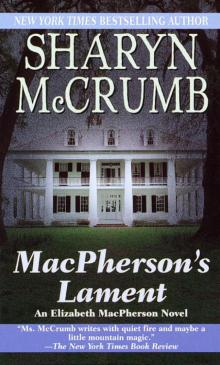 Elizabeth MacPherson 07 - MacPherson’s Lament
Elizabeth MacPherson 07 - MacPherson’s Lament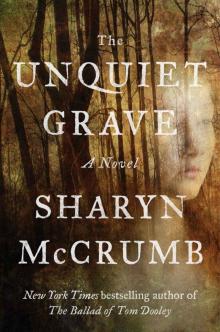 The Unquiet Grave: A Novel
The Unquiet Grave: A Novel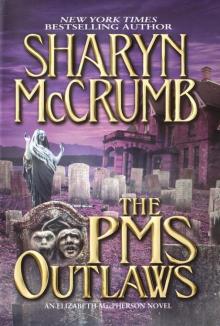 The PMS Outlaws: An Elizabeth MacPherson Novel
The PMS Outlaws: An Elizabeth MacPherson Novel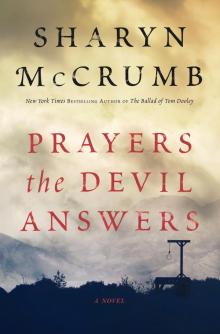 Prayers the Devil Answers
Prayers the Devil Answers Paying the Piper
Paying the Piper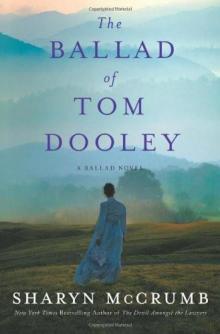 The Ballad of Tom Dooley: A Ballad Novel
The Ballad of Tom Dooley: A Ballad Novel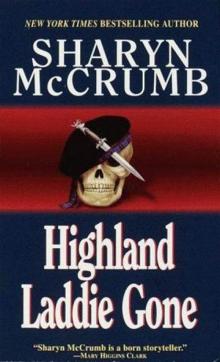 Highland Laddie Gone
Highland Laddie Gone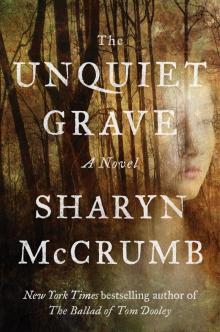 The Unquiet Grave
The Unquiet Grave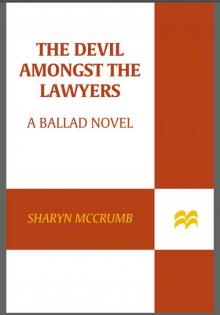 The Devil Amongst the Lawyers
The Devil Amongst the Lawyers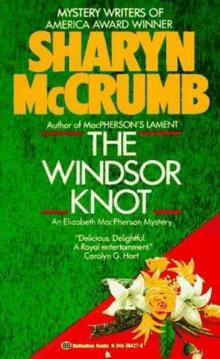 The Windsor Knot
The Windsor Knot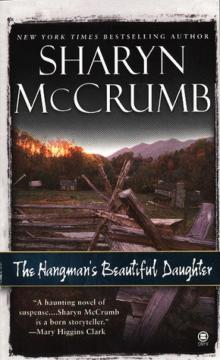 The Hangman's Beautiful Daughter
The Hangman's Beautiful Daughter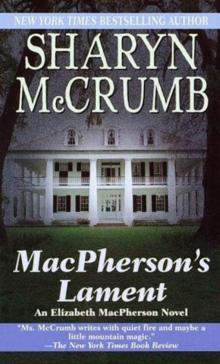 MacPherson's Lament
MacPherson's Lament The Ballad of Tom Dooley
The Ballad of Tom Dooley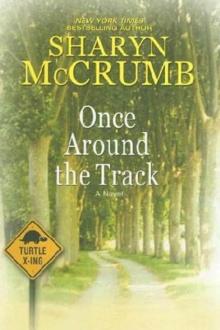 Once Around the Track
Once Around the Track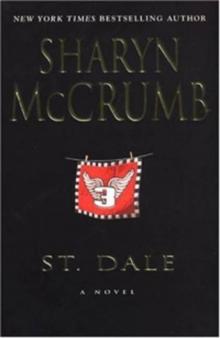 St. Dale
St. Dale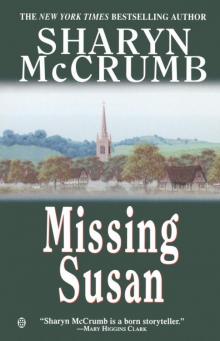 Elizabeth MacPherson 06 - Missing Susan
Elizabeth MacPherson 06 - Missing Susan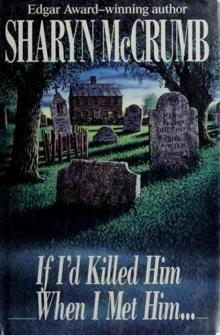 If I'd Killed Him When I Met Him…
If I'd Killed Him When I Met Him…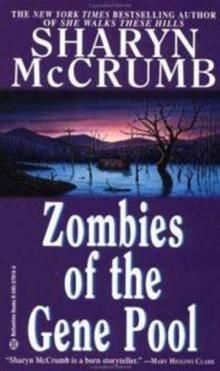 Zombies of the Gene Pool
Zombies of the Gene Pool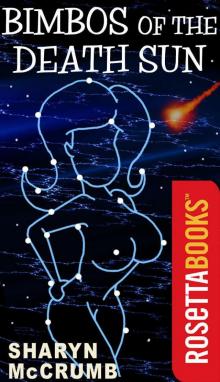 Bimbos of the Death Sun
Bimbos of the Death Sun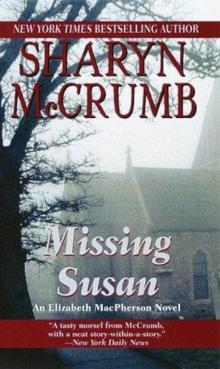 Missing Susan
Missing Susan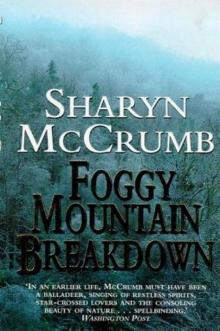 Foggy Mountain Breakdown and Other Stories
Foggy Mountain Breakdown and Other Stories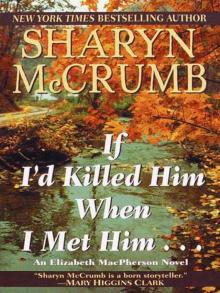 If I'd Killed Him When I Met Him
If I'd Killed Him When I Met Him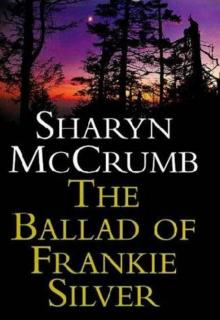 The Ballad of Frankie Silver
The Ballad of Frankie Silver Lovely In Her Bones
Lovely In Her Bones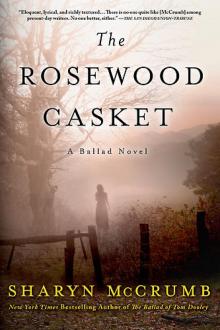 The Rosewood Casket
The Rosewood Casket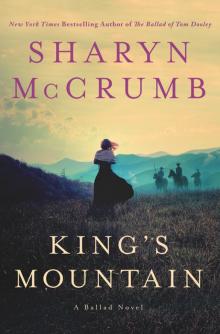 King's Mountain
King's Mountain